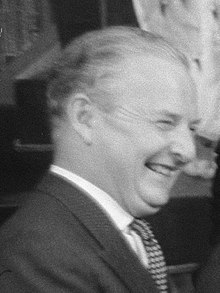Selwyn Lloyd
John Selwyn Brooke Lloyd, Baron Selwyn-Lloyd (born July 28, 1904 in West Kirby near Liverpool , † May 18, 1978 in Oxfordshire ) was a conservative British politician .
Career
Selwyn Lloyd was the son of John Wesley (Jack) Lloyd and Mary Rachel Warhurst. He attended Leas School in Hoylake, Fettes College in Edinburgh and Magdalene College in Cambridge.
In 1930 he was appointed to the bar by Gray's Inn , founded a law firm in Liverpool and was admitted to the Hoylake Urban District Council . After he had run unsuccessfully as a Liberal candidate for parliament in Macclesfield in 1929 , he initially concentrated on his legal career. In 1931 he left the Liberals and joined the Conservatives . From 1932 to 1940 he was a councilor in Hoylake .
When World War II broke out, he was drafted into the Royal Horse Artillery , where he served on the General Staff until 1942. In 1943 he was posted to the Second British Army, where he was involved in planning D-Day . On D-Day he was on the French coast with his commanding officer, Lieutenant General Miles Dempsey . In 1945 he was promoted to brigadier general.
As a representative of his constituency Wirral , he moved into the British House of Commons in the 1945 elections . In 1951 he married Elizabeth Marshall, with whom he had a daughter and from whom he divorced in 1957. In the Winston Churchill government , Lloyd was minister of state in the State Department under Anthony Eden from 1951 to 1954 . After serving as Minister of Supply from 1954 to 1955 and Minister of Defense in 1955, he became Foreign Minister at the end of the same year due to a cabinet reshuffle. During his term of office, the Suez crisis fell , which led to the resignation of Prime Minister Eden; Lloyd remained foreign minister in the cabinet of Eden's successor Harold Macmillan until 1960 and then (1960–1962) held the office of Chancellor of the Exchequer .
In the so-called Night of the Long Knives on July 13, 1962, Prime Minister Macmillan dismissed seven of his cabinet members, including Lloyd, who then remained in the House of Commons as a simple MP until he was appointed Lord Seal Keeper and Leader of the House of Commons from Alec Douglas-Home in 1963 was brought back to the government, which he left after the election defeat of the Conservatives in 1964.
In the Conservative government in 1971, he was the successor to the Labor politician Horace King Lower House Chairman (Speaker of the British House of Commons); he held the office until 1976. In the same year he was raised to the nobility and has since carried the title of Baron Selwyn-Lloyd , of Wirral in the County of Merseyside .
Selwyn-Lloyd died in 1978 at his Oxfordshire estate.
Own publications
- Mr Speaker, sir . 1976.
- Suez 1956: a Personal View . 1978.
literature
- DR Thorpe: Selwyn Lloyd . Jonathan Cape Verlag 1989. ISBN 0-224-02828-6 (English)
Web links
- Wiener Zeitung : Operation Musketeer ( Memento from September 30, 2007 in the Internet Archive )
| personal data | |
|---|---|
| SURNAME | Lloyd, Selwyn |
| ALTERNATIVE NAMES | Lloyd, John Selwyn Brooke, Baron Selwyn-Lloyd |
| BRIEF DESCRIPTION | British politician |
| DATE OF BIRTH | July 28, 1904 |
| PLACE OF BIRTH | West Kirby near Liverpool |
| DATE OF DEATH | May 18, 1978 |
| Place of death | Oxfordshire |
